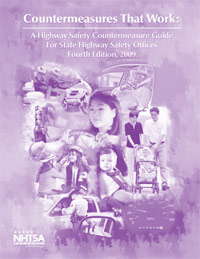

Countermeasures That Work

HSRC researchers have revised and updated the 4th edition of Countermeasures That Work, a reference guide to assist State Highway Safety Offices in selecting effective, science-based traffic safety countermeasures for major highway safety problem areas. Researchers who prepared this edition include Arthur H. Goodwin, William L. Hall, J. Craig Raborn, Libby J. Thomas, and Mary Ellen Tucker. In this Fourth Edition, the chapter on seat belts has been expanded to include child passenger safety.
Funded by the National Highway Traffic Safety Administration, the guide contains a chapter for each problem area, including alcohol-impaired driving, seat belt use, aggressive driving and speeding, distracted and fatigued driving, motorcycle safety, young drivers, older drivers, pedestrians and bicyclists. Each chapter begins with a brief overview of the problem area, the main countermeasure strategies, a glossary of key terms and a few general references.
Countermeasures That Work will be updated on an annual basis. Users are invited to provide their suggestions and recommendations for the guide including how it can be improved and what additional problem areas should be included. To provide comments or suggestions, please contact NHTSA at countermeasuresthatwork@nhtsa.dot.gov.
The University of North Carolina Highway Safety Research Center
730 Martin Luther King Jr. Blvd, Suite 300 | Campus Box 3430 | Chapel Hill, NC 27599-3430
Phone: 919.962.2203 | Fax: 919.962.8710
http://www.hsrc.unc.edu